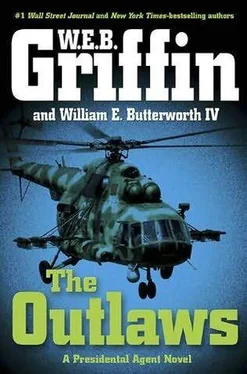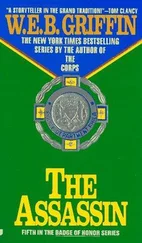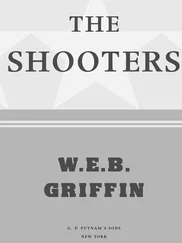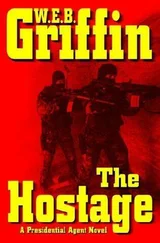W Griffin - The outlaws
Здесь есть возможность читать онлайн «W Griffin - The outlaws» весь текст электронной книги совершенно бесплатно (целиком полную версию без сокращений). В некоторых случаях можно слушать аудио, скачать через торрент в формате fb2 и присутствует краткое содержание. Жанр: Триллер, на английском языке. Описание произведения, (предисловие) а так же отзывы посетителей доступны на портале библиотеки ЛибКат.
- Название:The outlaws
- Автор:
- Жанр:
- Год:неизвестен
- ISBN:нет данных
- Рейтинг книги:3 / 5. Голосов: 1
-
Избранное:Добавить в избранное
- Отзывы:
-
Ваша оценка:
- 60
- 1
- 2
- 3
- 4
- 5
The outlaws: краткое содержание, описание и аннотация
Предлагаем к чтению аннотацию, описание, краткое содержание или предисловие (зависит от того, что написал сам автор книги «The outlaws»). Если вы не нашли необходимую информацию о книге — напишите в комментариях, мы постараемся отыскать её.
The outlaws — читать онлайн бесплатно полную книгу (весь текст) целиком
Ниже представлен текст книги, разбитый по страницам. Система сохранения места последней прочитанной страницы, позволяет с удобством читать онлайн бесплатно книгу «The outlaws», без необходимости каждый раз заново искать на чём Вы остановились. Поставьте закладку, и сможете в любой момент перейти на страницу, на которой закончили чтение.
Интервал:
Закладка:
"A lot of arf-arf," Whelan said.
"What the hell does that mean?"
Careful, Andy. That's two "hell's," probably the most you can get away with. Three "hell's," like three small boxes of wooden matches, will see the federal government landing on you in righteous indignation.
"That's the sound-you've heard it-dogs make when chasing their tails."
"You said that earlier today, didn't you?"
"Yes, I did. To describe various senior bureaucrats rushing around, chasing their tails."
"And so did President Clendennen. Or his spokesman, What's-his-name."
"John David Parker," Whelan offered, "more or less fondly known as 'Porky.'"
"Okay. So, Porky said the press was playing arf-arf, too. Which meant they were chasing their tails, right?"
"And so they were. Andy, do you really want to know what I think went on over there?"
"I want the straight scoop," McClarren said. "That's what we call the show."
"Okay. Take notes. There will be a quiz," Whelan said. "You know, Andy, right, that the United States has vowed never to use biological weapons against our enemies?"
"Uh-huh."
"This was largely because Senator Homer Johns, the junior senator from New Hampshire, thinks that while it is perfectly all right to shoot our enemies, or drop a bomb on them, it is unspeakably evil to use poison gas or some kind of biological weapon on them."
"You think poison gas is okay, Harry?"
"I think poison gas and biological weapons are terrible," Whelan said. "But let's talk about poison gas. In World War One, the Germans used poison gas on us, and we used it on them. It was terrible. In World War Two, the Germans didn't use poison gas, and neither did we. You ever wonder why?"
"You're going to tell me, right?"
"Because between the two wars, the Army developed some really effective poison gas. When we got in the war, and American troops were sent to Europe, so were maybe a half-dozen ships loaded with the new poison gas. We got word to the Germans that we wouldn't use our poison gas first, but if they did, we were prepared to gas every last one of them. They got the message. Poison gas was never used."
"Interesting."
"Then science came up with biological weapons. Our Army, in my judgment wisely, began to experiment with biological weapons. This happened at an obscure little Army base called Fort Detrick. The idea was that if our enemies-we're talking about Russia here-knew we really had first-class biological weapons, they would be reluctant to use their biological weapons on us."
"Like the atom bomb?"
Harry Whelan nodded. "Like atomic bombs, Andy. We weren't nuked by the Russians because they knew that if they did, then Moscow would go up in a mushroom cloud. They called that 'mutual assured destruction.' The same theory was then applied to biological and chemical weapons.
"Then we had a President running for reelection. Senator Johns and his pals thought painting him as a dangerous warmonger would see their guy in the White House. When the incumbent President saw in the polls that this was working, he quickly announced that he was unilaterally taking the United States out of the chemical-biological warfare mutual destruction game. He announced we wouldn't use them, period, and ordered the destruction of all such weapons sitting around in ordnance warehouses.
"This saw him reelected. But Johns wouldn't let him forget his campaign promise. So the Army's biological warfare laboratories at Fort Detrick were closed and the fort became the home of the U.S. Army Medical Research and Materiel Command. What could be more opposite to biological warfare than medical research?
"Even Senator Johns was satisfied that the forces of virtue had triumphed, and we would never use evil biological warfare against our enemies.
"But Army medical research should, it seemed logical to assume, concern itself with what would happen to our soldiers-even our civilian population-should our enemies use biological warfare against us.
"With that in mind, the medical corps began to study the biological weapons in the Russian inventory. If they knew what the Russians were going to use against us, we could come up with antidotes, et cetera.
"How would we know what biological weapons the Russians had? Enter the CIA."
"Really?"
Harry Whelan nodded again. "They bribed the appropriate Russian scientists, and soon samples of the Russian biological inventory began to arrive at Fort Detrick for evaluation by the medical corps.
"Since it was the CIA's duty to evaluate the efficacy of enemy weapons, and since the best place to determine that was Fort Detrick, and since the medical corps was a little short of funds, the CIA thought it only fair that they pay for the investigation.
"This had the additional benefit-since CIA expenditures are classified-of keeping Senator Johns and his pals from learning what was going on. Getting the picture, Andy?"
"That's a hell of an accusation, Harry."
Whelan did not reply directly.
"And inasmuch as the CIA was interested in knowing how soon the United States could respond in kind to a biological attack, they asked the medical personnel at Fort Detrick to determine how the Russian biological weapons were manufactured, and to estimate how long it would take-should the unthinkable happen-for us to get our manufacture of such up and running. Or even to compare the Russian biological weapons against our own from the bad old days-samples of our own had been retained for laboratory purposes-and see how long it would take to start to manufacture whichever seemed to be the most lethal."
"What you're suggesting, Harry," Andy McClarren said solemnly, "is that the CIA once again was engaged in doing things they're not supposed to. Once again doing things that the Congress had forbidden them to do."
"You sound like Senator Johns, Andy. And once again, you're both wrong. The CIA has the responsibility-given them by Congress-to find out as much as they can about our enemies' capabilities and intentions. That's what they were-are-doing at Fort Detrick. And thank God that they are."
"Give me a for-example, Harry," McClarren said, thickly sarcastic.
"How about a hypothetical, Andy?"
"Shoot."
"Let's suppose that the CIA, which really is not nearly as incompetent as you and people like Senator Johns think it is-or for that matter as incompetent as the CIA wants people like you and Johns and our enemies to think it is-"
"Run that past me again, Harry," McClarren said.
"They call that 'disinformation,' Andy. The less competent our enemies think the CIA is, the less they worry about it. Can I get back to my hypothetical?"
"Why not?" McClarren said, visibly miffed.
"Let's say the CIA heard that the bad guys, say the Russians, were operating a secret biological weapons factory in some remote corner of the world-"
"You're talking about that alleged biological weapons factory in the Congo," McClarren challenged.
Whelan ignored the interruption.
He went on: "-and they looked into it and found that there was indeed a secret factory in that remote corner of the world."
"Making what?" McClarren challenged, more than a little nastily.
"They didn't know. So what they did was go to this remote corner of the world-"
"Why don't you just say the Congo, Harry?"
"If that makes you happy, Andy. Let's say, hypothetically speaking of course, that the incompetent CIA went to the Congo and, violating the laws of the sovereign state of the Republic of the Congo, broke into this factory and came out with samples of what the factory was producing-"
"Ha!" McClarren snorted.
"-and took it to Fort Detrick, where it was examined by the medical corps scientists. And that these scientists concluded that what the CIA had brought to them was really bad stuff. And let's say that the CIA took this intelligence to the President. Not this one, his predecessor.
Читать дальшеИнтервал:
Закладка:
Похожие книги на «The outlaws»
Представляем Вашему вниманию похожие книги на «The outlaws» списком для выбора. Мы отобрали схожую по названию и смыслу литературу в надежде предоставить читателям больше вариантов отыскать новые, интересные, ещё непрочитанные произведения.
Обсуждение, отзывы о книге «The outlaws» и просто собственные мнения читателей. Оставьте ваши комментарии, напишите, что Вы думаете о произведении, его смысле или главных героях. Укажите что конкретно понравилось, а что нет, и почему Вы так считаете.











